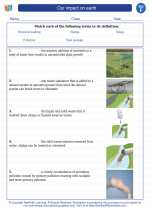Our impact on earth -> volcanic eruptions
Volcanic Eruptions
Volcanic eruptions are one of the most powerful and dramatic events in nature. They occur when molten rock, ash, and gases escape from an underground magma chamber through a vent in the Earth's surface. Volcanic eruptions can have a range of impacts, from creating new landforms to causing destruction and loss of life.
Causes of volcanic eruptions
Volcanic eruptions are caused by the movement of magma beneath the Earth's surface. Magma is formed from the melting of rock in the Earth's mantle, and it can rise towards the surface due to pressure and buoyancy. When the pressure becomes too great, or when the magma encounters a path to the surface, it can erupt as a volcano.
Types of volcanic eruptions
There are several different types of volcanic eruptions, including:
- Effusive eruptions: These eruptions involve the relatively gentle release of lava, which flows out of the volcano and forms new landforms.
- Explosive eruptions: These eruptions are more violent and involve the ejection of ash, rocks, and gases into the atmosphere. They can be extremely destructive and dangerous.
- Phreatic eruptions: These eruptions occur when water comes into contact with hot rock or magma, leading to explosive steam-driven blasts.
Effects of volcanic eruptions
Volcanic eruptions can have a range of effects on the environment and human populations, including:
- Lava flows: These can destroy buildings and infrastructure, but they can also create new land and fertile soil.
- Ash fall: Volcanic ash can travel long distances and disrupt air travel, as well as causing respiratory problems and damaging crops.
- Pyroclastic flows: These fast-moving currents of hot gas and volcanic matter can be extremely dangerous and destructive.
- Gases: Volcanic eruptions release gases such as sulfur dioxide, which can lead to acid rain and affect the Earth's climate.
Studying volcanic eruptions
Studying volcanic eruptions is important for understanding and mitigating their impacts. Scientists use a range of tools and techniques to monitor and study volcanoes, including:
- Seismometers: These instruments measure the seismic activity associated with magma movement.
- Gas sensors: These can detect the release of gases from a volcano, which can provide clues about impending eruptions.
- Remote sensing: Satellite imagery and other remote sensing techniques can be used to monitor changes in a volcano's surface.
- Field studies: Scientists also conduct field studies to gather samples and monitor volcanic activity up close.
Conclusion
Volcanic eruptions are powerful natural events with significant impacts on the environment and human populations. By studying and monitoring volcanic activity, scientists can work towards better understanding and predicting eruptions, ultimately helping to protect lives and property.
Study Guide
Here are some key points to remember about volcanic eruptions:
- What causes volcanic eruptions?
- What are the different types of volcanic eruptions?
- What are the effects of volcanic eruptions?
- How do scientists study volcanic eruptions?
Make sure to review the causes, types, effects, and study techniques related to volcanic eruptions to deepen your understanding of this fascinating natural phenomenon.
[Volcanic Eruptions] Related Worksheets and Study Guides:
.◂Science Worksheets and Study Guides Sixth Grade. Our impact on earth
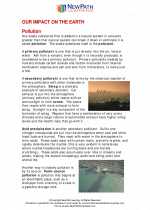
 Worksheet/Answer key
Worksheet/Answer key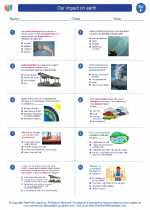
 Worksheet/Answer key
Worksheet/Answer key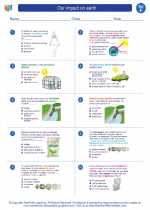
 Worksheet/Answer key
Worksheet/Answer key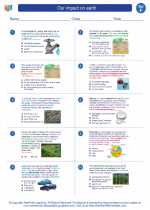
 Vocabulary/Answer key
Vocabulary/Answer key